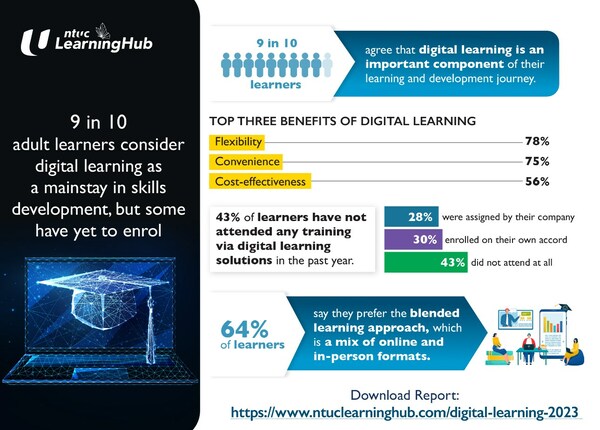 |
SINGAPORE, Sept. 11, 2023 /PRNewswire/ -- In an evolving labour market that is prioritising skills upgrading, nine in ten adult learners (18% strongly agree, 72% somewhat agree) say that digital learning is an important component in their learning and development (L&D) journey.
However, 43% voice that they have not attended any training through digital learning solutions in the past year. Those who are not Professionals, Managers, Executives, and Technicians, that is, non-PMETs (54%) and Baby Boomers (58%) are the least likely to have attended any training via digital learning solutions in the last year.

9 in 10 Adult Learners Consider Digital Learning as Mainstay in Skills Development, But Some Have Yet to Enrol
These are some of the key findings from the recently launched Special Report 2023 on Digital Learning, which aims to explore the role digital learning plays in supporting the L&D journey of Singapore's workforce. Based on a survey of 200 employed individuals in Singapore, and interviews with industry practitioners, the report also uncovers the learning preferences and needs among different demographic groups.
Although learners acknowledge the importance of digital learning, they also voice that having limited practical or hands-on experience (51%), lack of self-discipline (47%), online fatigue (44%), lack of guidance from instructors (43%), and lack of engagement (42%) are the top challenges they face when attending courses via digital learning solutions.
Therefore, a blended learning approach, comprising a mix of both online and in-person formats, emerges as the most preferred learning format as nearly two-thirds of learners (64%) say that it is most beneficial to their skills development, with Gen Zs (68%) and PMETs (75%) being more inclined towards it. This is followed by in-person only (14%) and online only (11%) learning formats.
In terms of learner participation, seven in ten (67%) reveal that they will attend courses through digital learning, only if it allows them to attain skills badges or micro-credentials. Moreover, four in five (83%) of learners say that micro-credentials earned from digital learning serve as a testament to one's skills.
In addition, learners cite flexibility (78%), convenience (75%), cost-effectiveness (56%), availability of different learning formats (48%), and wide variety of courses (46%) as the top five benefits of digital learning.
When it comes to learning on mobile devices, critical core skills (47%), data, artificial intelligence and machine learning (45%); and sector-related technical skills (42%) are the top skills PMETs are more likely to pick up. On the other hand, non-PMETs are more likely to acquire skills in mental health and well-being (41%), critical core skills (35%); and data, artificial intelligence and machine learning (33%) through mobile learning.
Commenting on the survey findings, Joe Loy, Managing Director of Digital Business at NTUC LearningHub says, "The workplace today has transformed and with it, the future of learning. The flexible nature of digital learning enables organisations to supplement it with existing in-person training programmes, and in turn, champion employees' lifelong learning and skills development. Therefore, this empowers learners to take charge of their learning while enhancing their employability. Thus, by tapping onto the accessible and affordable digital learning solutions in the market, organisations can ultimately enhance their workforce capabilities to the benefit of the organisation."
To download the Special Report 2023 – Digital Learning report, please visit https://www.ntuclearninghub.com/digital-learning-2023. To find out more about the courses, training, and grants, visit NTUC LearningHub's website at www.ntuclearninghub.com.
About NTUC LearningHub
NTUC LearningHub is the leading Continuing Education and Training provider in Singapore which aims to transform the lifelong employability of working people. Since our corporatisation in 2004, we have been working with employers and individual learners to provide learning solutions in areas such as Cloud, Infocomm Technology, Healthcare, Employability & Literacy, Business Excellence, Workplace Safety & Health, Security, Human Resources and Foreign Worker Training.
To date, NTUC LearningHub has helped over 29,000 organisations and achieved more than 2.6 million training places across more than 2,900 courses with a pool of about 900 certified trainers. As a Total Learning Solutions provider to organisations, we also forge partnerships to offer a wide range of relevant end-to-end training. Besides in-person training, we also offer instructor-led virtual live classes (VLCs) and asynchronous online learning. The NTUC LearningHub Learning eXperience Platform (LXP) — a one-stop online learning mobile application — offers timely, bite-sized and quality content for learners to upskill anytime and anywhere. Beyond learning, LXP also serves as a platform for jobs and skills development for both workers and companies.
For more information, visit www.ntuclearninghub.com.